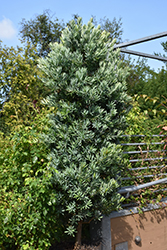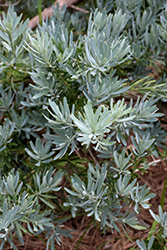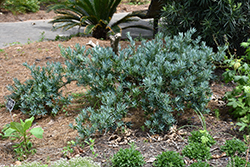It's all about ...
plants

Icee Blue Yellowwood
Podocarpus elongatus 'Monmal'
Height: 30 feet
Spread: 30 feet
Sunlight:
![]()
![]()
Hardiness Zone: 8b
Other Names: Breede River Yellowwood, Yellow-Wood
Description:
A unique variety of the species that grows naturally into a large multi-stemmed mound of upswept powder blue foliage; can be maintained as an informal screen or shaped as a landscape accent tree
Ornamental Features
Icee Blue Yellowwood has attractive powder blue evergreen foliage on a tree with an upright spreading habit of growth. The narrow leaves are highly ornamental and remain powder blue throughout the winter. The smooth gray bark and brown branches add an interesting dimension to the landscape.
Landscape Attributes
Icee Blue Yellowwood is a dense multi-stemmed evergreen tree with an upright spreading habit of growth. Its relatively fine texture sets it apart from other landscape plants with less refined foliage.
This is a relatively low maintenance tree, and can be pruned at anytime. It is a good choice for attracting birds to your yard. It has no significant negative characteristics.
Icee Blue Yellowwood is recommended for the following landscape applications;
- Accent
- Shade
- Vertical Accent
- Hedges/Screening
- Container Planting
Planting & Growing
Icee Blue Yellowwood will grow to be about 30 feet tall at maturity, with a spread of 30 feet. It has a low canopy with a typical clearance of 1 foot from the ground, and should not be planted underneath power lines. It grows at a slow rate, and under ideal conditions can be expected to live for 50 years or more.
This tree does best in full sun to partial shade. It is very adaptable to both dry and moist growing conditions, but will not tolerate any standing water. It is considered to be drought-tolerant, and thus makes an ideal choice for xeriscaping or the moisture-conserving landscape. It is not particular as to soil type or pH. It is somewhat tolerant of urban pollution. This is a selected variety of a species not originally from North America.
Icee Blue Yellowwood is a fine choice for the yard, but it is also a good selection for planting in outdoor pots and containers. Its large size and upright habit of growth lend it for use as a solitary accent, or in a composition surrounded by smaller plants around the base and those that spill over the edges. It is even sizeable enough that it can be grown alone in a suitable container. Note that when grown in a container, it may not perform exactly as indicated on the tag - this is to be expected. Also note that when growing plants in outdoor containers and baskets, they may require more frequent waterings than they would in the yard or garden. Be aware that in our climate, most plants cannot be expected to survive the winter if left in containers outdoors, and this plant is no exception. Contact our experts for more information on how to protect it over the winter months.
This plant is not reliably hardy in our region, and certain restrictions may apply; contact the store for more information.


